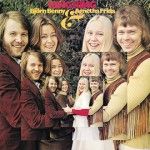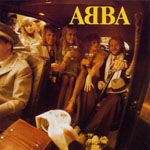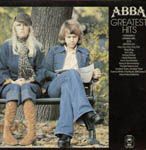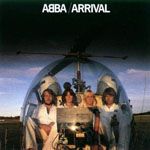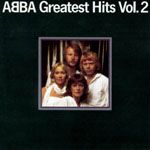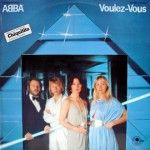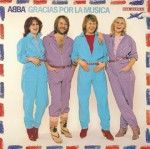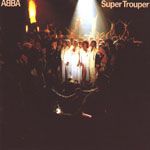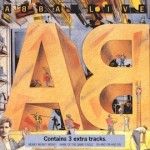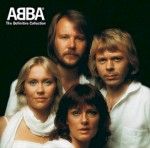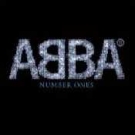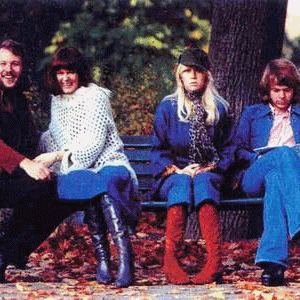ABBA
La historia de ABBA comenzó en junio de 1966, cuando Björn Ulvaeus (nacido en 1945) conoció a Benny Andersson (nacido en 1946) por primera vez. Björn was a member of the Hootenanny Singers, a very popular folk music group, while Benny played keyboards in Sweden's biggest pop group of the 1960s, The Hep Stars. Björn fue miembro de la Hootenanny Singers, un grupo de música folclórica muy popular, mientras que Benny tocó los teclados en el grupo más grande de Suecia pop de la década de 1960, The Hep Stars.
La pareja escribió su primera canción juntos ese mismo año, ya finales de la década se había establecido una colaboración regular como compositores. By that time, Benny had left The Hep Stars, while the Hootenanny Singers only existed in the recording studio. En ese momento, Benny había dejado The Hep Stars, mientras que los cantantes Hootenanny sólo existía en el estudio de grabación. The Hootenanny Singers released their records on the Polar Music record label, owned by Stig Anderson (1931–1997), who was to become ABBA's manager. El Hootenanny Singers lanzado sus discos en la discográfica Polar Music, propiedad de Stig Anderson (1931-1997), quien se convertiría en director de ABBA. Stig also contributed lyrics to many ABBA hits during the first years of the group's career. Stig también contribuyó letras de muchos éxitos de ABBA en los primeros años de la carrera del grupo.
En la primavera de 1969, Björn y Benny se reunieron las dos mujeres que iban a convertirse no sólo en sus novias, sino también la otra mitad de ABBA. Agnetha Fältskog (born 1950) had been a successful solo singer since releasing her first single in 1967. Agnetha Fältskog (nacida en 1950) había sido cantante solista desde el lanzamiento de su primer single en 1967. She and Björn were married in July 1971. Ella y Björn se casó en julio de 1971. Anni-Frid Lyngstad (born 1945), also known as Frida, started her recording career shortly before Agnetha. Anni-Frid Lyngstad (nacido en 1945), también conocida como Frida, comenzó su carrera discográfica poco antes de Agnetha. Frida was of Norwegian origin, but had moved to Sweden at a very early age. Frida era de origen noruego, pero se había trasladado a España a una edad muy temprana. Benny and Frida didn't get married until October 1978 Benny y Frida no se casaron hasta octubre de 1978
At first, the four members collaborated musically mainly by contributing songs, instrumental backing, production work or backing vocals to the recordings they each made as solo or duo acts. Al principio, los cuatro miembros colaborado musicalmente principalmente por canciones que aportan, apoyo instrumental, el trabajo de producción o los coros de las grabaciones que cada uno hizo como solistas o dúo. In 1970, the attractive sound of their four voices combined gave them the idea to put together the cabaret act Festfolk (which had the double meaning "engaged couples" and "party people"). En 1970, el sonido atractivo de sus cuatro voces unidas les dio la idea de poner juntos el cabaret acto Festfolk (que había el doble sentido "novios" y "Party People"). This first attempt failed, but in the spring of 1972 they recorded a song called 'People Need Love', garnering a medium-sized hit in Sweden. Este primer intento fracasó, pero en la primavera de 1972 grabaron una canción llamada "People Need Love", obteniendo un éxito de tamaño medio en Suecia. At this time they called themselves Björn & Benny, Agnetha & Anni-Frid. En este momento ellos mismos se llamaban Björn & Benny, Agnetha y Anni-Frid.
Animado por este éxito, que entró en el 1973 las selecciones de Suecia para el Festival de la Canción de Eurovisión con la canción "Ring Ring". They finished third, but the single and the album of the same name competed for the top positions on the Swedish chart. Terminaron terceros, pero el single y el álbum del mismo nombre, compitieron por los primeros puestos en las listas suecas. 'Ring Ring' also became a hit in several other European countries. "Ring Ring" también se convirtió en un éxito en varios países europeos.
The group entered the selections again in 1974, this time with 'Waterloo', which took them all the way to the finals in Brighton, England. El grupo entró en la selección de nuevo en 1974, esta vez con 'Waterloo', que los llevó hasta el final a las finales en Brighton, Inglaterra. By this time they had changed their name to ABBA, an acronym of their first names. En ese momento se había cambiado su nombre a ABBA, un acrónimo de sus nombres de pila. ABBA was also the name of a Swedish canned fish company, which luckily agreed to lending their name to a pop group. ABBA también fue el nombre de una empresa sueca de pescado enlatado, que por suerte accedió a prestar su nombre a un grupo de pop. The Eurovision Song Contest on April 6, 1974 turned out to be the most famous moment in ABBA history, when the group won the international juries over with 'Waterloo'. El Festival de Eurovisión en el 06 de abril 1974 resultó ser el momento más famoso de la historia de ABBA, cuando el grupo ganó el jurado internacional de nuevo con 'Waterloo'.
La historia de ABBA comenzó en junio de 1966, cuando Björn Ulvaeus (nacido en 1945) conoció a Benny Andersson (nacido en 1946) por primera vez. Björn was a member of the Hootenanny Singers, a very popular folk music group, while Benny played keyboards in Sweden's biggest pop group of the 1960s, The Hep Stars. Björn fue miembro de la Hootenanny Singers, un grupo de música folclórica muy popular, mientras que Benny tocó los teclados en el grupo más grande de Suecia pop de la década de 1960, The Hep Stars.
La pareja escribió su primera canción juntos ese mismo año, ya finales de la década se había establecido una colaboración regular como compositores. By that time, Benny had left The Hep Stars, while the Hootenanny Singers only existed in the recording studio. En ese momento, Benny había dejado The Hep Stars, mientras que los cantantes Hootenanny sólo existía en el estudio de grabación. The Hootenanny Singers released their records on the Polar Music record label, owned by Stig Anderson (1931–1997), who was to become ABBA's manager. El Hootenanny Singers lanzado sus discos en la discográfica Polar Music, propiedad de Stig Anderson (1931-1997), quien se convertiría en director de ABBA. Stig also contributed lyrics to many ABBA hits during the first years of the group's career. Stig también contribuyó letras de muchos éxitos de ABBA en los primeros años de la carrera del grupo.
En la primavera de 1969, Björn y Benny se reunieron las dos mujeres que iban a convertirse no sólo en sus novias, sino también la otra mitad de ABBA. Agnetha Fältskog (born 1950) had been a successful solo singer since releasing her first single in 1967. Agnetha Fältskog (nacida en 1950) había sido cantante solista desde el lanzamiento de su primer single en 1967. She and Björn were married in July 1971. Ella y Björn se casó en julio de 1971. Anni-Frid Lyngstad (born 1945), also known as Frida, started her recording career shortly before Agnetha. Anni-Frid Lyngstad (nacido en 1945), también conocida como Frida, comenzó su carrera discográfica poco antes de Agnetha. Frida was of Norwegian origin, but had moved to Sweden at a very early age. Frida era de origen noruego, pero se había trasladado a España a una edad muy temprana. Benny and Frida didn't get married until October 1978 Benny y Frida no se casaron hasta octubre de 1978
At first, the four members collaborated musically mainly by contributing songs, instrumental backing, production work or backing vocals to the recordings they each made as solo or duo acts. Al principio, los cuatro miembros colaborado musicalmente principalmente por canciones que aportan, apoyo instrumental, el trabajo de producción o los coros de las grabaciones que cada uno hizo como solistas o dúo. In 1970, the attractive sound of their four voices combined gave them the idea to put together the cabaret act Festfolk (which had the double meaning "engaged couples" and "party people"). En 1970, el sonido atractivo de sus cuatro voces unidas les dio la idea de poner juntos el cabaret acto Festfolk (que había el doble sentido "novios" y "Party People"). This first attempt failed, but in the spring of 1972 they recorded a song called 'People Need Love', garnering a medium-sized hit in Sweden. Este primer intento fracasó, pero en la primavera de 1972 grabaron una canción llamada "People Need Love", obteniendo un éxito de tamaño medio en Suecia. At this time they called themselves Björn & Benny, Agnetha & Anni-Frid. En este momento ellos mismos se llamaban Björn & Benny, Agnetha y Anni-Frid. Animado por este éxito, que entró en el 1973 las selecciones de Suecia para el Festival de la Canción de Eurovisión con la canción "Ring Ring". They finished third, but the single and the album of the same name competed for the top positions on the Swedish chart. Terminaron terceros, pero el single y el álbum del mismo nombre, compitieron por los primeros puestos en las listas suecas. 'Ring Ring' also became a hit in several other European countries. "Ring Ring" también se convirtió en un éxito en varios países europeos.
The group entered the selections again in 1974, this time with 'Waterloo', which took them all the way to the finals in Brighton, England. El grupo entró en la selección de nuevo en 1974, esta vez con 'Waterloo', que los llevó hasta el final a las finales en Brighton, Inglaterra. By this time they had changed their name to ABBA, an acronym of their first names. En ese momento se había cambiado su nombre a ABBA, un acrónimo de sus nombres de pila. ABBA was also the name of a Swedish canned fish company, which luckily agreed to lending their name to a pop group. ABBA también fue el nombre de una empresa sueca de pescado enlatado, que por suerte accedió a prestar su nombre a un grupo de pop. The Eurovision Song Contest on April 6, 1974 turned out to be the most famous moment in ABBA history, when the group won the international juries over with 'Waterloo'. El Festival de Eurovisión en el 06 de abril 1974 resultó ser el momento más famoso de la historia de ABBA, cuando el grupo ganó el jurado internacional de nuevo con 'Waterloo'.

